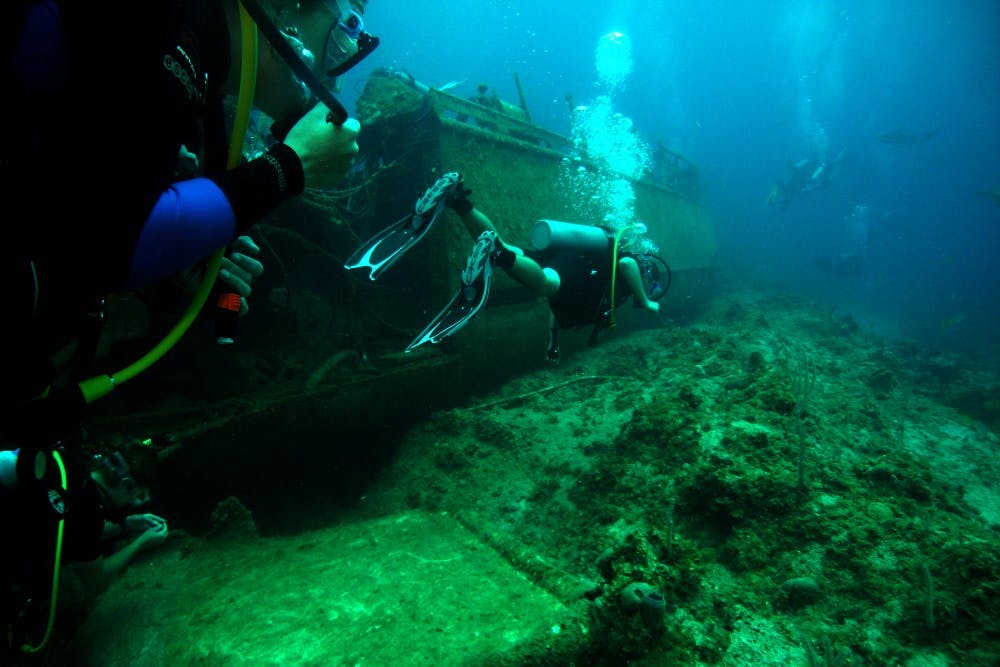Post-traumatic stress disorder and mental health issues confront our nation's military every day. Sometimes, the residual effects of combat can overcome veterans, leading them to commit suicide.
Joshua Grzywa, an aeronautical management and technology junior, started a veterans' outreach program called Deep Sea Valkyries following his first-hand experience with the hardships of assimilating back into society.
The program, an extension of Grzywa's already-existing dive business called Deep Sea Marauders, treats veterans to an all-expenses paid, week-long experience that involves diving, counseling and spiritual healing.
"We call (Deep Sea Valkyries) a voyage of healing to the mind, body and soul," he said.
Grzywa served for 15 years in the Army before medically retiring last year due to spinal injuries he suffered while deployed in Iraq. Before retiring, Grzywa said he was an avid adventurer, taking on activities like skydiving and rock climbing.
"My spinal doctor told me that skydiving and rock climbing weren't really in my future anymore and he encouraged me to look toward other activities, scuba diving being one of them," he said. "I always had kind of an adventurous nature to myself."
Although Grzywa had planned to create a veterans' outreach program to combine his love of adventure with bonding with his band of brothers, he said it began to take shape in March 2015, after seven men he served with committed suicide within a six-week period.
"A lot of people are familiar with the high rate of veteran suicides that are taking place in the country right now," he said. "I was aware of it, but it didn't really affect me until this past year, where, like I said, it was once a week, once every other week, people that I knew, that I served with, had just reached that point in their lives where they thought suicide was their only option."
Grzywa said he knew he had to take action and started developing Deep Sea Valkyries to help veterans heal both mentally and physically.
"We gather in small groups to discuss issues facing or faced," he said. "The focus really is being on this boat and redeveloping and re-experiencing that commodity that veterans remember from their time in service."
Although the rate of veteran suicides is declining since a peak of more than 500 in 2012, Grzywa said there continues to be a need for suicide rates and post-traumatic stress disorders to be addressed in a respectful manner.
"A big part of our message is: it's okay to have this post-traumatic stress," he said. "We don't judge them for that, but at the same time, we want our participants to recognize, and we're hoping other veterans will realize that this is okay, but it's not okay to let it consume an individual to where they feel their only option is suicide."
Karen Kattar, a clinical psychologist with the U.S. Department of Veteran's Affairs, said veterans dealing with post-traumatic stress disorder should seek help and remember that recovery is possible as long as they receive the appropriate treatment.
"People can recover from PTSD," she said. "There's a myth out there that you can't recover. I think what people are referring to is that you will always have your memories, you can't erase your memories and you will from time-to-time still have symptoms, but when you go through treatment, you actually could no longer have a diagnosis of PTSD."
Jonathan Cudo, a Marine Corps veteran and participant in ASU's Professional Flight Program with Grzywa, said reconnecting with his fellow veterans through the Deep Sea Valkyries program helped him assimilate back into civilian life.
"It's such a good experience because ... you kind of instantly connect with these people on a personal level that is different than anything else that I've ever experienced because — I can't even explain it," he said. "Being back with your brothers-in-arms, it's such a great feeling."
Grzywa said he hopes Deep Sea Valkyries will give veterans an outlet where they can begin to heal both physically and mentally from their time overseas.
"It's absolutely heartbreaking to hear or to see an individual who served their country with honor ... return home to an area where they should be safe, be in such a dark place where suicide is their only option," he said. "We're gonna do what we can to make sure veterans aren't in that place anymore."
Related Links:
Video games are a critical part of my PTSD treatment regimen
Former UA researcher seeks new location to conduct marijuana PTSD study
Reach the reporter at Jlsuerth@asu.edu or follow @SuerthJessica on Twitter.
Like The State Press on Facebook and follow @statepress on Twitter.




